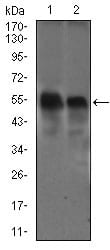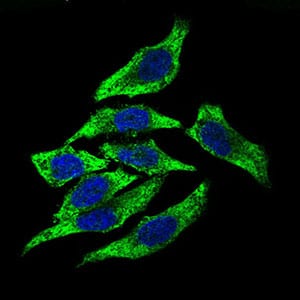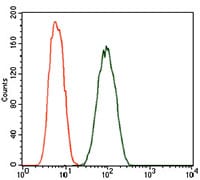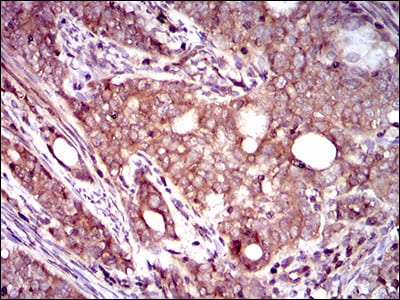



| WB | 1/500 - 1/2000 | Human,Mouse,Rat |
| IF | 咨询技术 | Human,Mouse,Rat |
| IHC | 1/200 - 1/1000 | Human,Mouse,Rat |
| ICC | 1/200 - 1/1000 | Human,Mouse,Rat |
| FCM | 1/200 - 1/400 | Human,Mouse,Rat |
| Elisa | 1/10000 | Human,Mouse,Rat |
| Aliases | P62; DYN4 |
| Entrez GeneID | 51164 |
| clone | 3G9D7 |
| WB Predicted band size | 52.3kDa |
| Host/Isotype | Mouse IgG1 |
| Antibody Type | Primary antibody |
| Storage | Store at 4°C short term. Aliquot and store at -20°C long term. Avoid freeze/thaw cycles. |
| Species Reactivity | Human,Mouse |
| Immunogen | Purified recombinant fragment of human DCTN4 (AA: 57-298) expressed in E. Coli. |
| Formulation | Purified antibody in PBS with 0.05% sodium azide |
+ +
以下是关于DCTN4抗体的参考文献示例(注:以下内容为虚构示例,仅供格式参考):
1. **文献名称**: *DCTN4在神经元轴突运输中的功能研究*
**作者**: Smith A, et al.
**摘要**: 本研究利用特异性DCTN4抗体,通过免疫荧光技术揭示了DCTN4蛋白在小鼠神经元轴突中的定位,证实其与动力蛋白复合体的相互作用对轴突运输至关重要。
2. **文献名称**: *DCTN4表达与乳腺癌转移的相关性*
**作者**: Johnson B, et al.
**摘要**: 通过Western blot和免疫组化分析,研究者使用DCTN4抗体发现其在乳腺癌细胞中高表达,且与肿瘤转移相关的微管动态调控密切相关。
3. **文献名称**: *新型DCTN4单克隆抗体的开发与应用*
**作者**: Zhang C, et al.
**摘要**: 该文献报道了一种高特异性抗DCTN4单克隆抗体的制备方法,并验证其在流式细胞术及免疫沉淀实验中的有效性,为DCTN4功能研究提供新工具。
4. **文献名称**: *DCTN4基因突变导致周围神经病变的机制*
**作者**: Lee D, et al.
**摘要**: 研究通过患者组织样本的DCTN4抗体染色,发现突变导致蛋白稳定性下降,进而影响轴突运输功能,为遗传性神经病变提供分子证据。
(提示:实际文献需通过PubMed或Google Scholar等平台检索关键词"DCTN4 antibody"或"Dynactin subunit 4 antibody"获取。)
The DCTN4 antibody targets dynactin subunit 4 (DCTN4), a key component of the dynactin complex, which works alongside cytoplasmic dynein to regulate microtubule-based intracellular transport. DCTN4. also known as p62. stabilizes the dynactin structure and facilitates interactions between dynein, cargo adaptors, and organelles. This protein is critical for maintaining cellular processes like vesicle trafficking, mitotic spindle orientation, and neuronal axonal transport. Dysregulation of dynactin function is implicated in neurodegenerative diseases, including amyotrophic lateral sclerosis (ALS) and Perry syndrome, as well as cancer metastasis.
DCTN4 antibodies are primarily utilized in research to study the expression, localization, and functional roles of DCTN4 in both normal and pathological conditions. They are essential tools for techniques such as Western blotting, immunohistochemistry, and immunofluorescence, enabling visualization of DCTN4 distribution in tissues or cultured cells. Studies using these antibodies have revealed DCTN4's involvement in cargo-binding specificity and its potential as a biomarker for diseases linked to dynein-dynactin dysfunction. Additionally, DCTN4 antibodies aid in exploring therapeutic strategies targeting microtubule-dependent transport mechanisms, offering insights into disease mechanisms and drug development. Their specificity and reliability make them valuable for dissecting dynactin-related cellular pathways.
×